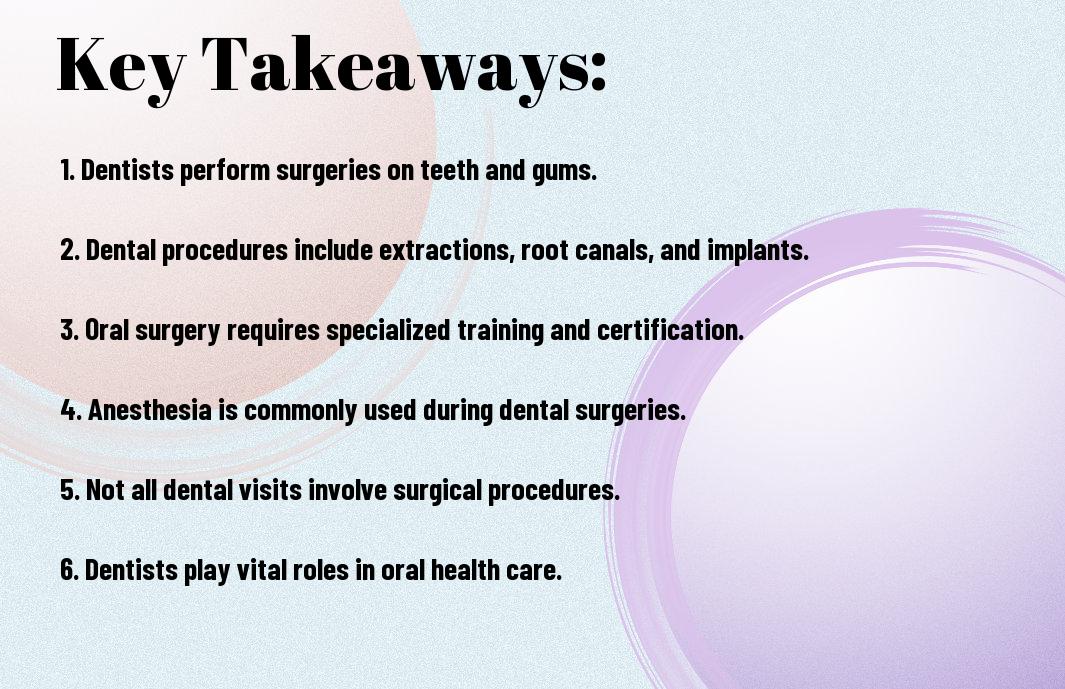Most people often wonder about the role of dentists and whether they can be classified as a type of surgery. A dentist specializes in oral health, focusing on the prevention, diagnosis, and treatment of dental issues. While dental procedures can involve surgical techniques, such as tooth extractions or gum surgeries, the field of dentistry encompasses much more than just surgery. In this post, you will gain a clearer understanding of the distinction between dental practices and surgical procedures, allowing you to make informed decisions about your oral health care.
Key Takeaways:
- Definition: A dentist is primarily a healthcare professional specializing in oral health rather than a general surgeon.
- Procedures: Dentists perform a variety of dental procedures, including cleanings, fillings, and root canals, which may resemble surgical interventions.
- Specialization: Some dentists are oral surgeons who focus on surgical procedures related to teeth and jaw, but not all dentists perform surgery.
- Education: Dental education is distinct from general medicine, with dentists undergoing specific training in dentistry.
- Patient Care: Dentistry emphasizes the prevention and management of oral diseases, highlighting a holistic approach to oral health.

Understanding Dentistry
The field of dentistry is dedicated to the diagnosis, treatment, and prevention of oral health issues. Dentists play a vital role in maintaining not just your teeth, but also your overall health. Regular dental visits can help you avoid more serious health complications linked to poor oral hygiene, thus making comprehensive care an crucial part of maintaining your well-being.
The Role of a Dentist
Role of a dentist extends beyond simply treating dental issues; they are your partners in maintaining oral health and guiding you through preventive care. By offering routine check-ups and personalized advice, dentists help you keep your teeth and gums healthy, ultimately contributing to your overall health and quality of life.
Types of Dental Procedures
The types of dental procedures encompass a variety of treatments designed to maintain or restore oral health. These procedures can range from preventive measures to restorative surgeries. Common types include:
- Routine cleanings
- Fillings
- Root canals
- Crowns and bridges
- Orthodontics
Thou can learn about each specific procedure and its purpose to better understand your own dental care needs.
| Procedure Type | Description |
|---|---|
| Preventive Care | Basic cleaning and check-ups |
| Restorative | Fillings, crowns, bridges |
| Cosmetic | Whitening, bonding, veneers |
| Orthodontics | Braces and aligners |
| Oral Surgery | Extractions and implants |
This comprehensive classification of procedures helps you navigate the diverse services offered in dentistry. It’s crucial to consult your dentist to identify which procedures are best suited to your oral health needs:
- Preventive check-ups
- Emergency care
- Cosmetic enhancements
- Comprehensive surgeries
- Education on oral hygiene
Thou will gain insight into your dental options and how they contribute to a healthier smile.
The Definition of Surgery
Even if you often associate surgery with hospitals and operating rooms, the term encompasses a broader range of procedures performed by medical professionals to diagnose or treat a condition. Surgery involves the use of instruments to alter tissues, organs, or body functions. Understanding this definition can clarify the various practices encompassed within the surgical domain, including those performed by dentists.
Surgical Procedures in Medicine
Beside the standard notion of surgery, numerous surgical procedures exist within medicine. These can range from minimally invasive techniques to major operations aimed at treating ailments, injuries, or diseases. Procedures often require careful planning and skilled execution, highlighting the necessity for extensive training in both medical and surgical disciplines.
Comparing Dentistry with Other Surgical Fields
Among the various fields of surgery, dentistry plays a distinctive role. Below is a comparison of dentistry with other surgical specialties:
| Dentistry | Other Surgical Fields |
|---|---|
| Focuses on oral health, teeth, and jaws | Covers a wide range of body systems |
| Common procedures include fillings, extractions, and root canals | Includes surgeries like appendectomies, heart surgery, etc. |
| Often performed in outpatient settings | May require hospitalization |
Surgical practices vary significantly between dentistry and other medical fields. For example, dental surgeries, like wisdom tooth extractions, are usually less invasive and can often be performed in a dental office setting. In contrast, surgeries related to general medicine may involve extensive hospital stays and intricate operations. Understanding these differences can aid you in appreciating the varied roles that surgery plays across different health disciplines.
| Field | Typical Procedures |
|---|---|
| Dentistry | Tooth extractions, periodontal procedures |
| Orthopedics | Joint repairs, fracture fixations |
| Cardiothoracic | Bypass surgeries, valve replacements |

Are Dental Procedures Considered Surgery?
Despite common misconceptions, many dental procedures do fall under the umbrella of surgical practices. When you visit a dentist for work beyond regular check-ups or cleanings, such as tooth extractions or implant placements, these procedures can be classified as surgery. It is important to understand that dental surgery entails various techniques intended to treat issues within the oral cavity, and although it may differ from traditional surgeries, it still requires specific skills and knowledge.
Invasive vs. Non-Invasive Procedures
Between invasive and non-invasive dental procedures, the distinction primarily lies in the level of intervention required. Invasive procedures, like root canals or gum surgery, involve altering the tissues within your mouth, while non-invasive options, such as dental cleanings or whitening, do not. Knowing the difference helps you understand the nature of the care you receive and its implications for your health.
Regulatory and Professional Perspectives
Professional organizations have established clear criteria to define dental surgery. This includes the training and certifications dentists must achieve to perform specific procedures. Understanding these regulations enables you to appreciate the standards of care provided in dental practices.
Another aspect of regulatory and professional perspectives involves the guidelines set forth by organizations such as the American Dental Association (ADA). These organizations emphasize the safety and effectiveness of dental procedures classified as surgery, ensuring that dental professionals adhere to high standards. By choosing a dentist accredited by such associations, you can feel confident that you are receiving care that meets stringent regulatory requirements, ultimately prioritizing your oral health and safety.
The Impact of Dental Procedures on Health
Your oral health significantly contributes to your overall well-being. Dental procedures, from routine cleanings to complex surgeries, can affect not just your teeth and gums, but also your body as a whole. Maintaining good oral health reduces the risk of systemic health issues, such as heart disease and diabetes, highlighting the interconnectedness of dental care and overall health. Prioritizing your dental visits ensures that you enjoy both a healthy mouth and a healthier life.
Oral Health and Overall Health
Across various studies, a strong correlation between oral health and overall health has emerged. Poor dental hygiene can lead to infections and inflammation, which may impact other parts of your body. This emphasizes the importance of maintaining good oral hygiene practices and regularly visiting your dentist. By taking care of your mouth, you directly contribute to your overall health and reduce potential health risks.
The Importance of Surgical Precision in Dentistry
By ensuring surgical precision during dental procedures, you can greatly enhance your recovery and long-term outcomes. Precision minimizes complications and promotes faster healing, allowing you to return to your daily routine without unnecessary setbacks.
Health and safety are paramount when undergoing dental procedures. The precision of your dentist plays a vital role in ensuring successful outcomes. Proper techniques not only avoid complications during surgery but also facilitate smoother recovery. When dentists employ surgical precision, the risk of infection diminishes, and you can expect better functional results. Optimal outcomes in dental care significantly enhance your quality of life, showing you that investing time in dental procedures can yield substantial benefits for your overall health.
Common Misconceptions about Dentistry and Surgery
All too often, people confuse dentistry with general surgery, leading to misconceptions about the roles of dental practitioners. While both fields involve medical expertise, dentists specialize in oral health, focusing on teeth, gums, and related structures rather than performing surgical procedures on other body parts. Understanding these distinctions can help you navigate your healthcare options more effectively.
Myths and Facts
Along with confusion about their roles, myths surrounding dentistry can lead to misunderstandings about the seriousness and nature of dental care. One common myth is that dental visits are purely cosmetic; in reality, they play a significant role in your overall health. Regular dental check-ups can prevent more serious health issues, proving that oral care is vital and not just about aesthetics.
Patient Perceptions
After visiting a dental clinic, you might feel anxious or uncertain about the procedures involved. Many patients have preconceived notions about dentistry being painful or invasive, which can affect their willingness to seek necessary care. It’s important to challenge these perceptions and recognize that modern dental practices prioritize patient comfort and use advanced techniques to minimize discomfort.
Understanding how you perceive dental care can significantly impact your approach to appointments. Often, fear stems from a lack of knowledge about what to expect during dental procedures. Practicing open communication with your dentist can help alleviate concerns and provide you with clarity on the steps involved in various treatments. By addressing your worries head-on, you can foster a more positive attitude toward maintaining your oral health.
Future of Dental Surgery
Not only is the field of dental surgery evolving, but it is also embracing innovative techniques that enhance patient care. Emerging research is paving the way for more minimally invasive procedures, which promise quicker recovery times and increased comfort for you. As you continue to explore these advancements, understanding their implications will empower you to make informed decisions about your dental health.
Advances in Dental Techniques
Techniques in dental surgery are rapidly advancing, offering more efficient and effective treatments for patients like you. Innovations such as laser therapy, guided implant surgery, and regenerative procedures are making it possible to address dental issues with less discomfort and improved outcomes. Staying informed about these techniques will help you appreciate the shifting landscape of dental care.
Integration of Technology in Dentistry
Future advancements in dentistry are heavily dependent on the integration of technology, shaping the way your dental health is managed. The use of digital imaging, artificial intelligence, and 3D printing is transforming treatment planning and patient consultations. These technologies enhance precision, reduce errors, and facilitate better communication between you and your dental professionals.
Advances in digital technology have led to the development of tools that streamline various aspects of dental practice. For instance, virtual reality can provide a new way to help you understand treatment options, while AI-driven diagnostics can assist your dentist in identifying potential issues more effectively. Moreover, digital records and tele-dentistry are revolutionizing how you engage with your dental care team, making appointments more convenient and informative. As these innovations continue to advance, your experience in the dental chair is set to become more personalized and efficient.
To Wrap Up
Now that you understand the role of a dentist in surgical procedures, it’s clear that while dentists perform some surgical tasks, not all are classified as surgeries. For any specific dental surgery requirements, consider consulting with a professional to learn about their capabilities. If you’re interested in exploring more about the procedures a general dentist can handle, check out What Oral Surgery Can a General Dentist Do? for insightful information to guide you in your dental care journey.
Q: Is a dental procedure considered a surgery?
A: Yes, certain dental procedures can be classified as surgeries. For example, tooth extractions, dental implants, and gum surgeries fall under the category of surgical procedures. These surgeries typically involve the manipulation of tissues or structures in the mouth and may require anesthesia or sedation. However, not all dental treatments, such as routine cleanings or fillings, are considered surgical.
Q: What types of dental surgeries are commonly performed?
A: Common types of dental surgeries include tooth extractions, including wisdom teeth removal, dental implants which involve surgically placing a post into the jawbone, and periodontal surgery to treat gum disease. Other examples include root canal therapy, which can require surgical intervention if there are complications, and biopsies of oral tissues. Each of these procedures aims to address various dental issues that cannot be treated through standard dental care methods.
Q: Do all dentists perform surgical procedures?
A: Not all dentists perform surgical procedures. General dentists may carry out minor surgeries, such as simple extractions or certain types of gum work. However, more complex surgeries often require the expertise of specialists, like oral surgeons or periodontists, who receive additional training specifically in surgical techniques and procedures. If surgery is needed, a general dentist may refer the patient to one of these specialists.






